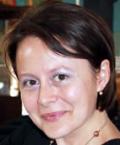Biography
I am a specialist in rhetoric and writing studies. I have a Phd in Composition, Literacy and Culture from Indiana University and an MA in TESOL/ Applied Linguistic (secondary area: Socio-Linguistic Anthropology) from Iowa State University. Before joining the University of Glasgow, I was an Assistant Professor of Rhetoric and Composition at the University of North Carolina at Greensboro.
My research is transdisciplinary, bringing together strands from translingualism, cultural education and social justice, digital literacies, and computational rhetoric. My work has appeared in Computers and Composition and JAEPL: The Journal of the Assembly for Expanded Perspectives on Learning and I am currently involved in a series of projects with professional and public impact.
At the University of Glasgow, I am part of the TESOL team in the School of Education since 2016. While I am working on the TESOL programme, I am also delivering a series of lectures, seminars, and workshops on academic writing. With a teaching experience of 12 years+, I have worked with a variety of students: novice writers, advanced and honors students, multilingual learners, and professional writers. I find inspiration in my students' energy and dedication to learning and in my colleagues' robust work.
Research interests
My areas of expertise and interest include:
- digital literacies
- theories of cultural diversity and social inclusion
- academic writing
- translingualism and translingual pedagogy
I am currently involved in two projects which reflect the interdiscilinary nature of my research:
Strengthening Urban Engagement of Universities in Asia and Africa (SUEUAA)
This project addresses a core problem in emerging economies of strengthening the urban engagement role of universities, and ways they contribute to developing sustainable cities in the context of the major social, cultural, environmental and economic challenges facing the global south. It seeks to strengthen the capacity of universities to contribute to city resilience towards natural and human-made disasters. Examples of urban engagement include supporting the development of physical infrastructure, ecological sustainability, and social inclusion (including the social inclusion of migrants). The project assesses the extent to which universities in 6 countries (Iran, Iraq, the Philippines, South Africa, Tanzania and Zimbabwe) respond to the demands of society, and how through dialogue with city stakeholders this response can be enhanced. The project builds on the work of a collaborative team from the UK and the above-mentioned emerging economies.
Challenging the Translingual Turn: Student-Teachers' Perceptions, Practices and Networks
This project, supported by the British Council, explores the potential and limitations of the translingual turn for TESOL student-teachers who move from their MA studies into the workplace. Now that we have established that language learners are always engaged in translingual practices, to what extent do teachers actively engage within the same translingual framework in their classrooms? The research will explore student-teachers' language ideologies at the beginning of their postgraduate studies, their changing perceptions and practices during their studies, and the take-up and implementation of new pedagogies when they return in their home countries. The project will map out pedagogical changes, expectations, and practices collected from student-teachers, as well as other direct stakeholders in the students' working contexts (such as programme coordinators, supervisors, and other language professionals). Findings from this research will indicate possible ways of supporting a translingual agenda to make a more sustainable impact on local stakeholders who may be less familiar or open to a translingual approach.
I am co-editing (with John Jones, Ohio State University) the book entitled Rhetorical Machines: From Rhetorical Code to Computational Ethics
Rhetorical Machines brings together scholar-practitioners from rhetoric, computer science, and writing studies to analyze new and unexplored relationships between persuasion and code. Looking at a variety of computational machines, the essays draw attention to the rhetorical nature of code and call for interdisciplinary understandings of human-machine interactions. The chapters collected in Rhetorical Machines shed light on the production, distribution, and reception of digitally mediated communication generated by algorithmic and mathematical procedures, coding languages, and software. The collection offers a fresh look at social-computational relations by analyzing hybrid machines that combine rhetorical and computational logics into new mechanics.
I have also recently completed a research report on a project implemented by the Scottish Refugee Council:
The evaluation report covers the implementation period of the project supporting New Scots' social and language integration over a period of six months. Building on a peer education model, the project enabled peer groups to bring together non-native English speakers and local community members to support and develop two-way integration in four local areas across Scotland. The report also includes evidence of language support from other comparative locations across Scotland and proposes a model for working across language barriers.
Publications
Hirsu, L. (2015) An overview of digital feminist scholarship (2005-2014): Methods and methodologies. Peitho, 18(1),
Hirsu, L. (2015) Tag writing, search engines, and cultural scripts. Computers and Composition, 35, pp. 30-40. (doi:10.1016/j.compcom.2015.01.002)
Hirsu, L. (2014) Branching out and staying in: inviting a transmedia approach. Digital Rhetoric Collaborative,
Hirsu, L. (2012) Reflections on accidental testimonies and spectacular witnesses. Journal of the Assembly for Expanded Perspectives on Learning, 18(1), pp. 40-55. 6.
Hirsu, L. (2017) 'Where am I? Do you have WiFi?’: vital technologies and precarious living in the Syrian refugee crisis. In: Hesford, W. S., Licona, A. C. and Teston, C. (eds.) Precarious Rhetorics. Ohio State University Press. (Accepted for Publication)
Hirsu, L. (2016) Clicks, tweets, links, and other global actions: the nature of distributed agency in digital environments. In: Rice, R. and St. Amant, K. (eds.) Thinking Globally, Composing Locally: Rethinking Online Writing in the Age of the Global Internet. University of Utah Press. (Accepted for Publication)
Hirsu, L. (2014) The available means of persuasion: Mapping a theory and pedagogy of multimodal public rhetoric, David M. Sheridan, Jim Ridolfo, Anthony J. Michel. Parlor Press, Anderson, S.C. Computers and Composition, 32, pp. 19-21. (doi:10.1016/j.compcom.2014.04.001) [Book Review]
Hirsu, L. and Bryson, E. (2017) Sharing Lives, Sharing Languages: A Pilot Peer Education Project for New Scots' Social and Language Integration - Evaluation Report June 2017. Project Report. Scottish Refugee Council.

